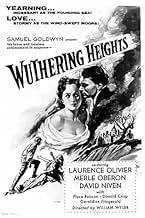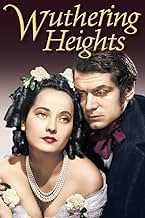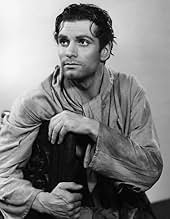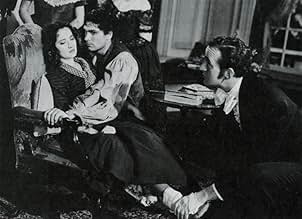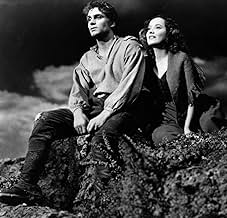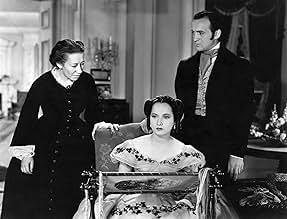VALUTAZIONE IMDb
7,5/10
20.724
LA TUA VALUTAZIONE
Una domestica nella casa di Wuthering Heights racconta a un viaggiatore la sfortunata storia degli amanti Cathy e Heathcliff.Una domestica nella casa di Wuthering Heights racconta a un viaggiatore la sfortunata storia degli amanti Cathy e Heathcliff.Una domestica nella casa di Wuthering Heights racconta a un viaggiatore la sfortunata storia degli amanti Cathy e Heathcliff.
- Regia
- Sceneggiatura
- Star
- Vincitore di 1 Oscar
- 9 vittorie e 7 candidature totali
Sarita Wooton
- Cathy (as a child)
- (as Sarita Wooten)
Frank Benson
- Heathcliff Servant
- (non citato nei titoli originali)
Romaine Callender
- Robert
- (non citato nei titoli originali)
Richard Clucas
- Little Boy
- (non citato nei titoli originali)
Vernon Downing
- Giles
- (non citato nei titoli originali)
Recensioni in evidenza
Director William Wyler and star Laurence Olivier bring to life the atmosphere and most important characters of a classic novel in "Wuthering Heights". While necessarily omitting much of the material for cinematic purposes, and having a slightly different emphasis, the film version will still be appreciated by those who enjoy classic stories.
The Emily Brontë novel on which the film is based is one of the greatest books of its kind. It is far deeper than any film version could be, so for this movie only a portion of the story is used, and several characters are omitted. The movie also has more of a melodramatic feel than did the novel. It does retain the flashback-style of narrative, which works just as well in the film as it did in the book.
The story opens with a weary traveler meeting up with a now-aging, hostile, and excitable Heathcliff (Olivier), after the main action of the story is in the past. Unsettled by this strange man, the traveler is told Heathcliff's story by the housekeeper Ellen (Flora Robson). This begins with Heathcliff's childhood, and goes through his relations with the Earnshaw family and the Linton family. The heart of the story is his troubled romance with Catherine Earnshaw (Merle Oberon), whom he has known since being taken in by her family as a child. This relationship in turn leads to conflicts with most of the other characters, and affects the lives of everyone involved in profound ways.
Olivier memorably portrays this difficult character, and helps the audience feel his longing and restlessness. Oberon is also ideal as Catherine - a mercurial character who is both a complement and a contrast to Heathcliff. The other main strength of the film is its realization of the main settings, which are almost as important to the story as the characters are: once-fine but now gloomy and declining Wuthering Heights; the pleasant but vapid Thrushcross Grange, home of the Linton family; and especially the wild, mysterious Yorkshire moors, the only place where Heathcliff and Cathy are ever really happy. These settings are all effectively created and photographed, and provide an appropriate background to the events and tensions in the characters' lives.
The result is a movie that, while lacking the complexity of the novel, is a satisfying realization of the most important aspects of the book, and which effectively brings the audience into the lives and hearts of the characters.
The Emily Brontë novel on which the film is based is one of the greatest books of its kind. It is far deeper than any film version could be, so for this movie only a portion of the story is used, and several characters are omitted. The movie also has more of a melodramatic feel than did the novel. It does retain the flashback-style of narrative, which works just as well in the film as it did in the book.
The story opens with a weary traveler meeting up with a now-aging, hostile, and excitable Heathcliff (Olivier), after the main action of the story is in the past. Unsettled by this strange man, the traveler is told Heathcliff's story by the housekeeper Ellen (Flora Robson). This begins with Heathcliff's childhood, and goes through his relations with the Earnshaw family and the Linton family. The heart of the story is his troubled romance with Catherine Earnshaw (Merle Oberon), whom he has known since being taken in by her family as a child. This relationship in turn leads to conflicts with most of the other characters, and affects the lives of everyone involved in profound ways.
Olivier memorably portrays this difficult character, and helps the audience feel his longing and restlessness. Oberon is also ideal as Catherine - a mercurial character who is both a complement and a contrast to Heathcliff. The other main strength of the film is its realization of the main settings, which are almost as important to the story as the characters are: once-fine but now gloomy and declining Wuthering Heights; the pleasant but vapid Thrushcross Grange, home of the Linton family; and especially the wild, mysterious Yorkshire moors, the only place where Heathcliff and Cathy are ever really happy. These settings are all effectively created and photographed, and provide an appropriate background to the events and tensions in the characters' lives.
The result is a movie that, while lacking the complexity of the novel, is a satisfying realization of the most important aspects of the book, and which effectively brings the audience into the lives and hearts of the characters.
SPOILERS Out of the cinematic versions of Emily Bronte's incredible tale, this 1939 version is one of the furthest from it. However, as a piece of cinematic art, it is the finest, a shining example of Hollywood craftmanship made at a time when so many classic movies were being churned out. Producer Sam Goldwyn said it was the best movie he ever made. It's certainly director William Wyler's best film, and that includes Ben Hur. While Bronte's novel is a lot more than just a love story, this almost reduces it to being just a love story. Never mind, because as a love story, this film works wonderfully. Like almost all great love stories, it's gloriously romantic, emotionally intense and ultimately incredibly moving.
The controversial decision to miss out almost the entire second half of the book allowed the filmmakers to concentrate on the Heathcliff/Cathy love story, and Laurence Olivier and Merle Oberon both have incredible chemistry and strengh in their performances. No, they are not Bronte's characters, especially the film's version of Heathcliff, who here is FAR too nice, but are definitely one of the greatest of Hollywood's cinematic couples. This is especially notable in the scenes set on the moors, where we are definitely in that Olde Hollywood romantic never never land where the music soars and passion had to be, and was, encapsulated in a kiss. Olivier is impressive delivering some of Bronte's lines, of which there are a surprising amount, and the film does follow the book's plot very closely, it just tones down the darkness.
There are many superbly done sequences- the incredibly atmospheric opening where a traveller arrives at Heathcliff's house, all the scenes on the moors, Cathy's speech to Nelly "I AM Heathcliff", and of course, more than any other scene, the death of Cathy. As Heathcliff takes the dying Cathy to the window to see the moors once more and she finally dies virtually standing up, all the while while Alfred Newman's love theme plays and plays. This is one of the moving and also one of the most beautiful and artistic deaths in Hollywood history, all the more powerful for actually being comparatively understated by Hollywood standards of the time. Only those who had read the book or knew of the missing second half would know there was more in the story to come, in the context of the film the tale seems complete. Some don't like the final scene of Heathcliff and Cathy's ghosts wondering in the snow, but it is actually closer to the book's actual ending than most seem to admit. It's also one of the best tearjerkers ever, period.
Most people read the book and are than disappointed when they see this. It's therefore best to see this first, and to appreciate it as one of the great Hollywood love stories, before THAN reading the book. Yes, the book is still better, but than most books are.
The controversial decision to miss out almost the entire second half of the book allowed the filmmakers to concentrate on the Heathcliff/Cathy love story, and Laurence Olivier and Merle Oberon both have incredible chemistry and strengh in their performances. No, they are not Bronte's characters, especially the film's version of Heathcliff, who here is FAR too nice, but are definitely one of the greatest of Hollywood's cinematic couples. This is especially notable in the scenes set on the moors, where we are definitely in that Olde Hollywood romantic never never land where the music soars and passion had to be, and was, encapsulated in a kiss. Olivier is impressive delivering some of Bronte's lines, of which there are a surprising amount, and the film does follow the book's plot very closely, it just tones down the darkness.
There are many superbly done sequences- the incredibly atmospheric opening where a traveller arrives at Heathcliff's house, all the scenes on the moors, Cathy's speech to Nelly "I AM Heathcliff", and of course, more than any other scene, the death of Cathy. As Heathcliff takes the dying Cathy to the window to see the moors once more and she finally dies virtually standing up, all the while while Alfred Newman's love theme plays and plays. This is one of the moving and also one of the most beautiful and artistic deaths in Hollywood history, all the more powerful for actually being comparatively understated by Hollywood standards of the time. Only those who had read the book or knew of the missing second half would know there was more in the story to come, in the context of the film the tale seems complete. Some don't like the final scene of Heathcliff and Cathy's ghosts wondering in the snow, but it is actually closer to the book's actual ending than most seem to admit. It's also one of the best tearjerkers ever, period.
Most people read the book and are than disappointed when they see this. It's therefore best to see this first, and to appreciate it as one of the great Hollywood love stories, before THAN reading the book. Yes, the book is still better, but than most books are.
Talk about a brooding outdoors, those moody moors may represent a sense of liberation for the lovers, but they're not exactly inviting. Besides, it rains all the time, so best to be in the house even if mansions represent the confining space of class and class privilege. That's the trouble. Cathy is 'to the manor born', as they say. Thus she's really torn between the wild outdoors and the comforts of ballrooms and servants.
Then there's the enigmatic Heathcliffe, a dark wild-souled type guy, perfectly at home in those bleak rolling hills. He was a street ragamuffin before Cathy's elderly father adopted him into the manor as a stable boy. But he and a young Cathy manage to bond despite the class difference, a bond that eventually blossoms into true love. But that true love only breaks to the surface in the wild outdoors where a common humanity replaces artificial social distinctions. If only Cathy could find the will to break free of the leisure class.
What a great visual experience, the b&w expertly coordinated with the settings. When the two lovers approach the rocky crag, there's almost a feeling of an outdoor altar calling to them amidst the brooding hills. It's such a perfect visual contrast to the high-key ballrooms and parlors of the Lintons. The Lintons, however, are not to be despised despite their airs and privileges. In fact, they are very real victims of Cathy's suppressed feelings and Heathcliffe's cold calculations. As it turns out, there is no spectral salvation for them. As a result, the love being portrayed here is a kind of mad love, one that brings tragedy to all concerned. Thus, there's a reason those moors brood in dark fashion, while the movie itself remains the best of the many makes and remakes.
Then there's the enigmatic Heathcliffe, a dark wild-souled type guy, perfectly at home in those bleak rolling hills. He was a street ragamuffin before Cathy's elderly father adopted him into the manor as a stable boy. But he and a young Cathy manage to bond despite the class difference, a bond that eventually blossoms into true love. But that true love only breaks to the surface in the wild outdoors where a common humanity replaces artificial social distinctions. If only Cathy could find the will to break free of the leisure class.
What a great visual experience, the b&w expertly coordinated with the settings. When the two lovers approach the rocky crag, there's almost a feeling of an outdoor altar calling to them amidst the brooding hills. It's such a perfect visual contrast to the high-key ballrooms and parlors of the Lintons. The Lintons, however, are not to be despised despite their airs and privileges. In fact, they are very real victims of Cathy's suppressed feelings and Heathcliffe's cold calculations. As it turns out, there is no spectral salvation for them. As a result, the love being portrayed here is a kind of mad love, one that brings tragedy to all concerned. Thus, there's a reason those moors brood in dark fashion, while the movie itself remains the best of the many makes and remakes.
I saw this film many years before I read the book, I know which I prefer - OK, maybe with rose-tinted spectacles on. The book by Emily Bronte is an undeniable classic as is this film version but imho this is a much better use of one hundred and five minutes of life. And though they keep trying, this will remain the best condensation of the story, Wuthering Lites c/o the original Fantasy Factory.
Waif brought into well off Yorkshire home, grows up to fall in violent love with the masters daughter and violent hate with the son, and eventually owns the estate but not the woman. Laurence Olivier and Merle Oberon are perfect as the manic birds of a feather Heathcliff and Cathy with David Niven as the elegant sidelined husband. Everyone is portrayed as faulty or unlikeable in some way, romance is seen as hopeless childishness leading at best to passionate petulance, at worst to death; love is as strange as people. It's relentlessly beautiful stuff, gloriously photographed by Gregg Toland with a glowing atmosphere and a most assured production than has not been possible to achieve again. The spirit of nonsensical romance has been lost in this more cynical age. Favourite bits: Miles Mander's melodramatics at the beginning resulting in Flora Robson's picture-long flashback; the windswept pair on the rocks; the pair gatecrashing the dance; Oberon's unravelling to Niven and the tear-jerking finale. Director William Wyler had a long and illustrious career, but to my mind he never bettered this effort.
Watch it and weep; not only at the film's content but for a cinematic era long dead and never coming back.
Waif brought into well off Yorkshire home, grows up to fall in violent love with the masters daughter and violent hate with the son, and eventually owns the estate but not the woman. Laurence Olivier and Merle Oberon are perfect as the manic birds of a feather Heathcliff and Cathy with David Niven as the elegant sidelined husband. Everyone is portrayed as faulty or unlikeable in some way, romance is seen as hopeless childishness leading at best to passionate petulance, at worst to death; love is as strange as people. It's relentlessly beautiful stuff, gloriously photographed by Gregg Toland with a glowing atmosphere and a most assured production than has not been possible to achieve again. The spirit of nonsensical romance has been lost in this more cynical age. Favourite bits: Miles Mander's melodramatics at the beginning resulting in Flora Robson's picture-long flashback; the windswept pair on the rocks; the pair gatecrashing the dance; Oberon's unravelling to Niven and the tear-jerking finale. Director William Wyler had a long and illustrious career, but to my mind he never bettered this effort.
Watch it and weep; not only at the film's content but for a cinematic era long dead and never coming back.
10jotix100
"Wuthering Heights", based on the novel by Emily Bronte, gets a first rate treatment from its director, the genial William Wyler. The adaptation was done by Charles McArthur and Ben Hecht, two of the best writers working in the Hollywood of that era. The great cinematography by Gregg Toland makes it visually stunning. Alfred Newman's music score plays in the background, making this film a classic that will be cherished by movie lovers.
Some comments to this forum express their displeasure in the adaptation one sees on the screen. Most people forget what a task it must have been to get the essence of the Bronte novel in a cinematic form, something the adapters did with elegance and charm.
The cast that was assembled for "Wuthering Heights" is a dream come true. Presenting the young Merle Oberon in all her beauty makes one almost fall instantly in love with her. Ms. Oberon had a fantastic presence, which translated in probably her best work in films.
The dashingly handsome Laurence Olivier as Heathcliff, creates the right chemistry against Ms. Oberon's Cathy. Mr. Olivier was at the pinnacle of his career. He responds well to Mr. Wyler's direction. His Heathcliff shows a mean streak, but over all, Olivier gives an impressive performance.
David Niven is excellent as Edgar Linton, the man who wins Cathy's heart with his kindness. Flora Robson does also an outstanding job as Ellen, the housekeeper, who serves as the narrator. The young and beautiful Geraldine Fitzgerald makes a brilliant Isabella.
The rest of the players are equally wonderful, Donald Crisp, Hugh Willimas, Leo G. Carroll, Cecil Kellaway, made contributions to the movie.
Ultimately, this film is a love story doomed from the beginning. This tale of the passion between the lovers in the moors is a perfect way to lose oneself in the magic of the movies.
Some comments to this forum express their displeasure in the adaptation one sees on the screen. Most people forget what a task it must have been to get the essence of the Bronte novel in a cinematic form, something the adapters did with elegance and charm.
The cast that was assembled for "Wuthering Heights" is a dream come true. Presenting the young Merle Oberon in all her beauty makes one almost fall instantly in love with her. Ms. Oberon had a fantastic presence, which translated in probably her best work in films.
The dashingly handsome Laurence Olivier as Heathcliff, creates the right chemistry against Ms. Oberon's Cathy. Mr. Olivier was at the pinnacle of his career. He responds well to Mr. Wyler's direction. His Heathcliff shows a mean streak, but over all, Olivier gives an impressive performance.
David Niven is excellent as Edgar Linton, the man who wins Cathy's heart with his kindness. Flora Robson does also an outstanding job as Ellen, the housekeeper, who serves as the narrator. The young and beautiful Geraldine Fitzgerald makes a brilliant Isabella.
The rest of the players are equally wonderful, Donald Crisp, Hugh Willimas, Leo G. Carroll, Cecil Kellaway, made contributions to the movie.
Ultimately, this film is a love story doomed from the beginning. This tale of the passion between the lovers in the moors is a perfect way to lose oneself in the magic of the movies.
Lo sapevi?
- QuizLaurence Olivier found himself becoming increasingly annoyed with director William Wyler's exhausting style of filmmaking. After yet another take, he is said to have exclaimed, "For God's sake, I did it sitting down. I did it with a smile. I did it with a smirk. I did it scratching my ear. I did it with my back to the camera. How do you want me to do it?" Wyler's retort was, "I want it better." However, Olivier later said these multiple takes helped him learn to succeed as a movie actor.
- BlooperThough the social situations, and even the soundtrack, are consistent with the novel's timeframe of 1770-1801, the Colonial/Napoleonic era, the costumes are an odd mix of mid-Victorian and American Civil War.
- Citazioni
Heathcliff: Catherine Earnshaw, may you not rest so long as I live on! I killed you. Haunt me, then! Haunt your murderer! I know that ghosts have wandered on the Earth. Be with me always. Take any form, drive me mad, only do not leave me in this dark alone where I cannot find you. I cannot live without my life! I cannot die without my soul.
- Curiosità sui creditiOpening credits prologue: On the barren Yorkshire moors in England, a hundred years ago, stood a house as bleak and desolate as the wastes around it. Only a stranger lost in a storm would have dared to knock at the door of Wuthering Heights.
- Versioni alternativeThere is an Italian edition of this film on DVD, distributed by DNA Srl: "CIME TEMPESTOSE (1939) + ORGOGLIO E PREGIUDIZIO (1940)" (2 Films on a single DVD), re-edited with the contribution of film historian Riccardo Cusin. This version is also available for streaming on some platforms.
- ConnessioniFeatured in AFI Life Achievement Award: A Tribute to William Wyler (1976)
- Colonne sonorePiano Sonata in A major, K.331: Rondo alla Turca
(1778) (uncredited)
Music by Wolfgang Amadeus Mozart
Played by Alice Ehlers on harpsichord
I più visti
Accedi per valutare e creare un elenco di titoli salvati per ottenere consigli personalizzati
Dettagli
- Data di uscita
- Paese di origine
- Sito ufficiale
- Lingua
- Celebre anche come
- Cime tempestose
- Luoghi delle riprese
- Azienda produttrice
- Vedi altri crediti dell’azienda su IMDbPro
Botteghino
- Lordo Stati Uniti e Canada
- 624.643 USD
- Fine settimana di apertura Stati Uniti e Canada
- 15.493 USD
- 9 apr 1989
- Lordo in tutto il mondo
- 624.643 USD
- Tempo di esecuzione1 ora 44 minuti
- Colore
- Proporzioni
- 1.37 : 1
Contribuisci a questa pagina
Suggerisci una modifica o aggiungi i contenuti mancanti



